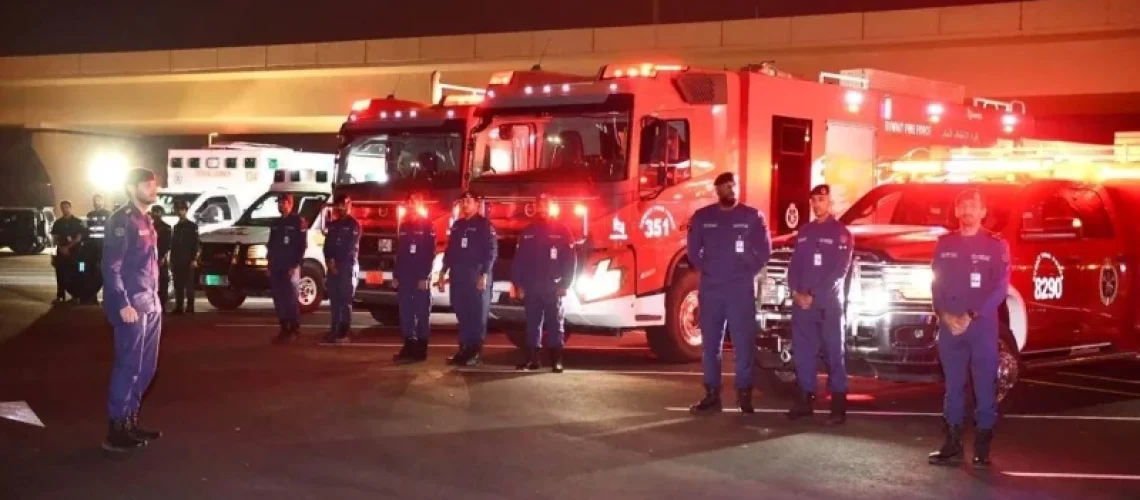Photo © https://kuwaitlocal.com/news/kuwait-fire-force-crisis-ready-247
While recent events in the Middle East have once again highlighted —if needed be —the chemical, biological, radiological and nuclear (CBRN) risks to which all countries in the region are exposed, Kuwait is more determined than ever to protect its population and critical infrastructure and to strengthen its resilience.
The Kuwait Fire Force recently confirmed its full operational capacity and unveiled a series of measures and state-of-the-art equipment designed to deal with any risks in this area.
In a statement to the KUNA news agency in June, General Mohammed Al-Ghareeb, Director of Public Relations for the Kuweit Fire Force, emphasized that all fire stations —land-based, sea-based, and located at airports —were ready to respond 24/7 thanks to a centralized alert and response system (1).
Strengthening the preparedness of emergency services requires both the acquisition of state-of-the-art technology and specialized training, which has been provided for several years in cooperation with a number of partners and allied countries.
State-of-the-art technological resources
Among the innovations recently brought into service is a high-tech CBRN reconnaissance vehicle capable of detecting toxic, radioactive or biological agents from a distance. This vehicle carries a mobile laboratory that can immediately analyze suspicious gases, liquids and particles at the scene of an incident. Advanced protective suits, a reconnaissance robot for high-risk areas, and a real-time weather monitoring system complete this arsenal.
In 2017, Kuwait inaugurated the world’s first integrated CBRN center thanks to a Swedish-Kuwaiti partnership (2). This state-of-the-art center for CBRN threat detection and response is the result of a strategic partnership between the Swedish company Saab, the Kuwaiti company Bader Sultan & Bros, and the Kuwait National Guard.
At the heart of this system is an innovative surveillance system, the AWR (Automatic Warning and Reporting) system, delivered by Saab in 2015. Thanks to a sophisticated network of fixed and mobile sensors, this advanced technology enables the detection, identification, monitoring, and automatic reporting of CBRN threats in real time. One of the system’s major advantages is its versatility: it can be used as a fixed installation, carried by hand or mounted on a vehicle, offering great operational flexibility. Saab has also established itself as one of the leading suppliers of CBRN reconnaissance vehicles for Kuwait. These mobile units are equipped with a laboratory capable of analyzing suspicious gases, liquids, and particles on site, enabling response teams to act quickly and provide adequate territorial coverage. The Kuwaiti company Bader Sultan & Bros, which specializes in medical and laboratory equipment, plays a crucial role in providing technical and logistical support.
In addition to this real-time CBRN threat detection system, the surveillance system currently includes:
• 29 ground stations at borders and in urban areas;
• 15 maritime stations.
These preparations have placed Kuwait at the forefront of CBRN protection worldwide, especially as another advantage of this integrated center is the simulation training it offers to units.
With this ability to anticipate, and in the aftermath of the air strikes on Iranian nuclear and military sites, Kuwait was able to mobilize its scientific expertise in mid-June to deal with the risks of radioactive leaks, actively preparing for possible chemical, radiological, and environmental fallout.
On June 16, 2025, the Minister of Electricity, Water and Renewable Energy, Dr. Sabeeh Al-Mukhaizeem, held a coordination meeting with senior officials from the Ministry of Health and the Kuwait Institute for Scientific Research (KISR) to coordinate preparations to deal with the potential environmental repercussions of the regional situation.
Here again, KISR experts presented advanced simulation systems to assess and predict environmental impacts under different conflict scenarios, while the Kuwaiti National Guard was able to confirm that the country’s radiological and chemical situation remained stable.
This measure to reassure the population has been particularly crucial in terms of crisis management…
By Murielle Delaporte
Notes
(1) Quoted in Al Defaiya >>> https://www.defaiya.com/news/Security/Security/2025/06/22/kuwait-fire-force-ready-for-cbrn-threats-as-regional-tensions-escalate
(2) See on this topic: >>> https://www.saab.com/newsroom/press-releases/2017/first-integrated-national-cbrn-centre-now-operational-in-kuwait
(3) See on this topic: https://kuwaittimes.com/article/29564/kuwait/other-news/kuwait-taps-scientific-expertise-amid-risks-of-radiation-leaks >>>
https://kuwaittimes.com/article/29564/kuwait/other-news/kuwait-taps-scientific-expertise-amid-risks-of-radiation-leaks
